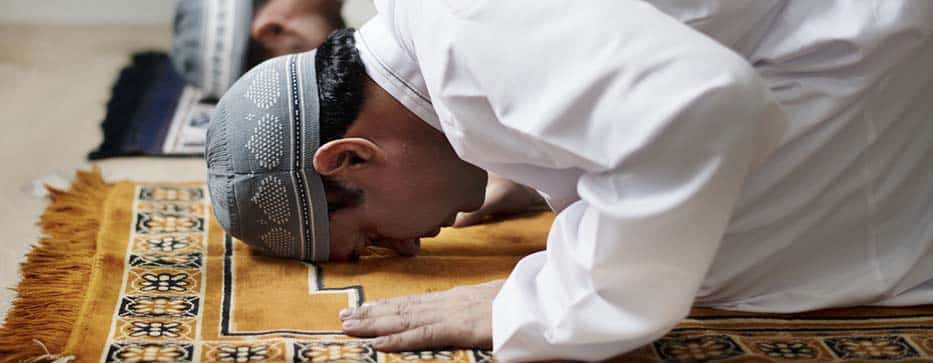Islam is the religion that Jordan It is considered official and majority. And it is key to understanding the daily life of the country. Therefore, on this page we tell you how it is present in society, what its pillars are and where its holiest places are located, as well as its main mosques.
Article 2 of the Constitution stipulates that the electionofJordan it is officially Islam. And it is not only a formality, but also a social reality: it is estimated that more than 97% of Jordanians profess the Muslim religion, leaving a residual 2% the percentage of Christians and less than 1% for other faiths, including Buddhism. And within that 97% of Muslims, the mainstream is Sunnism, with about 90% of the faithful, compared to less than 10% of Shiites.
However, Jordan was a fairly religiously tolerant country and, despite the fact that less than 3 per cent of the population professed other faiths, freedom of worship existed. This can be seen, above all, in the existence of churches in different cities and, above all, by respect for
Christian
and Jewish holy places in Jordanian territory, which are a real attraction for religious tourists.
Islam, therefore, is rooted in all levels of society: from politics to the family, through school and work. Therefore, daily life is determined by the rhythms of this life. Religion: Jordan is governed by the Muslim calendar (lunar instead of solar), which implies that one of its months is Ramadan, significantly slowing down daily life by the obligation to fast during the day.
Friday is usually the holy day of rest, on which the most important prayer of the week takes place, and opens on the Jordanian weekend, which also includes Saturday. Other aspects that recall the central role of the religion in Jordan are halal eating or the importance of marriage as a turning point in the life of any Jordanian.
But having said this and without denying the great influence that religion has in Jordan, it can be said that in this country the practical application of its uses and customs is somewhat more relaxed than in other countries of the Middle East. And this is largely the result of Jordan’s role as a balancing act between the region’s Arab traditions and its openness to the Western world.
That is why, as you will see around you, there are many women who do not cover their heads with the veil, also adopting a more international dress. Precisely the public role of women is more visible in society: from the world of work to the academic and political, although there is still a long way to go.

The central element of Islam in Jordan is, logically, the Koran: it is the holy book of this religion, considered the written reproduction of the word of God to the prophet Muhammad through the Archangel Gabriel. It has 114 chapters or azoras, which collect the basic beliefs of Muslims, as well as historical events that occurred before and during the life of Muhammad.
As reflected in the Sunni tradition, majority in Jordan, every good Muslim must be governed by five basic pillars:
For Islam and the faithful of this religion, Jordan occupies a very prominent place, both for events related to the life of Muhammad and with the historical episodes contained later in the process of expansion of this faith throughout the rest of the Middle East and North Africa.
For example, it is admitted that the Prophet Muhammad must have crossed this land on his famous night journey from Mecca to the Al-Aqsa Mosque in Jerusalem, to ascend to Heaven from there on the back of his winged horse Buraq.
That episode narrated in the Koran occurred around 621 AD, but in the following years, already after the death of Muhammad, Jordan was also the scene of other important events. For example, it was the first place where Islam spread outside the Arabian Peninsula, that is, the first land in which this religion came into contact with the non-Islamic world.
In addition, it was the board of operations of the first battles to expand the Muslim faith, in this case against the Byzantine Empire, which dominated the area: in the battle of Mu’tah (Karak Governorate) in 629 and the two of Yarmouk (634 and 636), the second being the truly decisive and victorious, which opened the doors to Muslim expansion.
In addition, here is another aspect especially relevant to this religion: Jordan It houses the tombs of some of Muhammad’s main companions, who adopted different roles to spread the Muslim faith and who, some time later, are the object of veneration and pilgrimage. The following can be highlighted:
In addition to these holy places for this religion, in Jordan There are also important and imposing mosques. And to the delight of non-Muslims, some of these temples can be visited touristically, always respecting the rules of behavior and never during prayer hours.
Some of the most interesting mosques in the country are:
On the pages dedicated to each destination you can find more information about these mosques and other holy places for this religion in Jordan, which are often part of the circuits and guided tours.
Fill out the form below to receive a free non-binding quote tailor-made by a specialized agency in Jordan.
DMC travel agency specializing in tailor-made trips to Jordan
Mandala Tours, S.L, NIF: B51037471
License: C.I.AN-187782-3